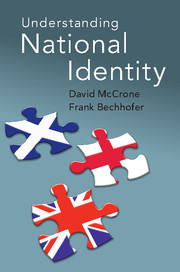Book contents
- Frontmatter
- Contents
- List of tables
- Preface
- Introduction
- 1 Thinking about national identity
- 2 Accessing national identity
- 3 National identity: do people care about it?
- 4 Debatable lands: national identities on the border
- 5 Claiming national identity
- 6 The politics of national identity
- 7 The notional other: ethnicity and national identity
- 8 A manner of speaking: the end of being British?
- 9 Whither national identity?
- Appendix National identity publications
- Bibliography
- Index
6 - The politics of national identity
Published online by Cambridge University Press: 05 April 2015
- Frontmatter
- Contents
- List of tables
- Preface
- Introduction
- 1 Thinking about national identity
- 2 Accessing national identity
- 3 National identity: do people care about it?
- 4 Debatable lands: national identities on the border
- 5 Claiming national identity
- 6 The politics of national identity
- 7 The notional other: ethnicity and national identity
- 8 A manner of speaking: the end of being British?
- 9 Whither national identity?
- Appendix National identity publications
- Bibliography
- Index
Summary
Identity only becomes an issue when it is in crisis, when something assumed to be fixed, coherent and stable is displaced by the experience of doubt and uncertainty. (Mercer, 1990: 43)
It would seem self-evident to say that national identity is ‘political’. After all, in Scotland in particular the last two decades have been intensely ‘political’, and arguably the decade or two before that. Since the 1970s, agitation about ‘home rule’ has sought to mobilise national identity. The politics of national identity were brought to the fore by the rise of the Scottish National Party in the mid-1970s on the back of the discovery of North Sea oil; Labour's attempt to create a Scottish Assembly in the second half of the 1970s culminating in the first referendum in 1979; its failure in constitutional terms, and the election of the Thatcher government. The creation of, and elections to, the Scottish Parliament since 1999, especially the electoral successes of the SNP in 2007 and 2011, would seem to confirm an intimate relationship between politics and national identity. And England was not immune to the effects of these constitutional changes. Creating a Parliament in Scotland (and an Assembly in Wales) highlighted the so-called West Lothian Question (WLQ), the apparent contradiction of non-English politicians being able to ‘interfere’ in ‘England-only’ matters at Westminster while English MPs could not vote on those same issues decided at Holyrood. The topic has begun to attract the attention of political scientists such as Michael Kenny who argues that English nationhood ‘remains a subject which is usually skirted rather than directly engaged, and is mainly confined to the margins of political analysis. There are still only a few academic books devoted to this question, and English national identity has been studied much less extensively than its Scottish and Welsh counterparts’ (Kenny, 2014: 1).
- Type
- Chapter
- Information
- Understanding National Identity , pp. 120 - 140Publisher: Cambridge University PressPrint publication year: 2015

